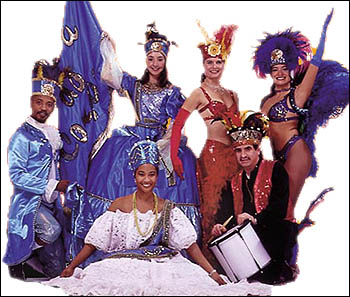![[Metroactive Stage]](/stage/gifs/stage468.gif)
[ Stage Index | Silicon Valley | Metroactive Home | Archives ]
Long Distance Love Affair
The connection between Africa, Latin America and Brazil is explored in month-long program
By Jesse 'Chuy' Varela
EVER SINCE Carmen Miranda sang and danced samba in MGM musicals in the 1940s, Brazilian culture has infiltrated the U.S. pop mainstream. From '60s bossa nova and Black Orpheus to young stars like Bebel Gilberto and Canadian pop singer Nelly Furtado--who represents her Portuguese roots with flying capoeira dancers on her MTV videos--a rich cultural continuum has surged from south to north.
Now a piece of Brazilian culture is coming to the Silicon Valley on the occasion of Black History Month to create a "cultural connection" between the black and Latino communities in and around San Jose. The African Spirit in Latin America is a month-long series of events and exhibits that kicks off Friday (Feb. 1), with a pre-Carnaval offering called Ritmo Do Brasil--The Rhythm of Brazil.
"A few years ago I met Leon Beechman," remembers Laura Esparza, newly returned program director at the Mexican Heritage Plaza. "We started talking about life and came up with the idea that we should bring our communities together on the occasion of Black History Month to celebrate our commonalties. Obviously, we found that Brazil, which has the largest population of African descent in both North and South America, was a cultural connection that could be made by both Latinos and Africans here in the Bay Area."
With the percussive bateria of Bay Area drum school Loco Bloco, the spectacular Samba do Coraçao and the martial arts ballet of Capoeira of San Jose, the Mexican Heritage Plaza explores the fascinating Pandora's box that is Africa in the Americas. But as sponsors the Mexican Heritage Plaza, Pacific Bell and the African American Alliance Community Organization initially sat around planning this event they realized no Brazilians were at the table.
"We had to connect with the people we were talking about," continues Esparza. "So a whole group of the organizers went over to Capoeira of San Jose and started taking capoeira. These were people in their 40s and 50s trying it out for the first time so they could make that connection."
Capoeira of San Jose is one of the crown jewels of Brazilian culture in the San Jose/Silicon Valley. The group was started in 1989 by mestre (first-degree master) Wagner Bueno, who began practicing capoeira in 1970 in his native Sao Paulo Brazil before immigrating to the United States. In 1995 he and his wife, Tammy, opened an academy that now has more than 150 students studying the Afro-Brazilian martial arts dance form.
"What capoeira brings to the South Bay," says Tammy Bueno, "is not just the physical aspect of learning a martial arts but a social aspect as well that brings people together of varied ages and personalities. The last 13 years have been a long road teaching capoeira in little community centers when nobody knew what it was. Presentations like this one have a long-term effect that introduce people to this martial arts dance form."
Continuing the theme, a wall-to-wall mural exhibit--Ie Camara--by Fabio Moura, from Sao Paulo, will present the history of capoeira at La Galleria exhibition hall at the Plaza, and a Brazil/Silicon Valley Learning Collaborative featuring student presentations will explore the connections between African culture in Brazil and Silicon Valley.
"The learning collaborative is one component that we're really proud of," concludes Esparza. "Three high schools from Brazil hooked up with three high schools in San Jose and for a couple of months have been talking over the Internet about different issues connected to the African diaspora in both cultures. At the end of February, they get to teleconference and see each other and share the results of their conversations. It will be midnight in Brazil when we talk to them, but it will definitely be a 21st-century kind of event."
Other events that celebrate African American History Month that are not Brazilian-related include Tabia African American Theatre Ensemble and the San Jose Multicultural Artists Guild's presentation of Yellow Eyes by Puerto Rican playwright Migdalia Cruz (Feb. 15-23). Community Voices in Praise on Saturday (Feb. 2) will also unite the faith community with an evening of choirs from local churches.
[ Silicon Valley | Metroactive Home | Archives ]
Copyright © Metro Publishing Inc. Metroactive is affiliated with the Boulevards Network.
For more information about the San Jose/Silicon Valley area, visit sanjose.com.
![]()

Carnaval's in Town: Intricate head wear is part of Samba do Coraçao's appeal.
Ritmo Do Brasil/The Rhythm of Brazil performs Friday (Feb. 1) at 8pm at the Mexican Heritage Plaza, 1700 Alum Rock Ave., San Jose. Admission is $20 adv/$25 dr. The African Spirit in Latin America: A Celebration of Brazilian Culture takes place throughout February; call 408.928.5564 for more information.
From the January 31-February 6, 2002 issue of Metro, Silicon Valley's Weekly Newspaper.